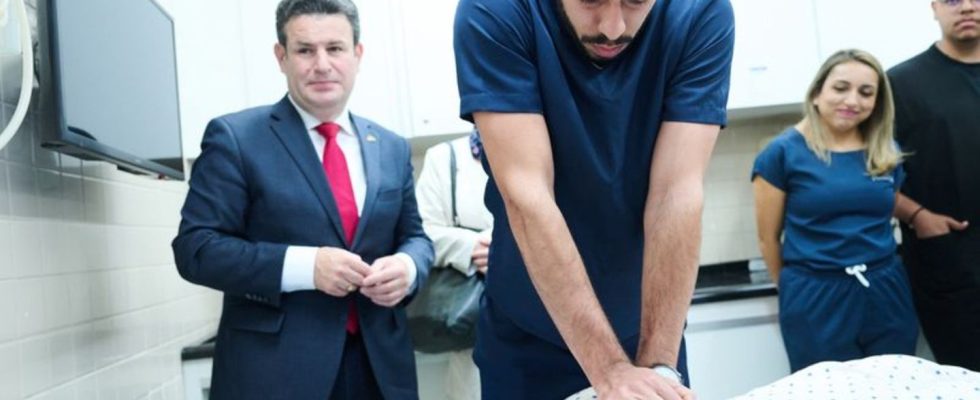skills shortage
Baerbock and Heil on a promotional tour for nurses in Brazil
Federal Minister of Labor Hubertus Heil (SPD) visits a Catholic university in Brasilia, where you can complete a bachelor’s degree in nursing. photo
© Annette Riedl/dpa-pool/dpa
Foreign Minister Baerbock and Labor Minister Heil travel together to the largest country in Latin America. It’s about a topic that burns under the nails at home. And about international crisis issues.
Foreign Minister Annalena Baerbock and Labor Minister Hubertus Heil see good opportunities to recruit more qualified nursing staff from Brazil.
“Brazilian nurses and Colombian electricians are already finding open arms in Germany. We want to expand this partnership,” said Baerbock at the start of a joint trip to Latin America with Heil in the capital Brasília. Together they promoted Germany as a location with good working and living conditions.
Brazil is the largest country in South America and also Germany’s most important trading partner there. According to Heil, there are currently fewer than 200 Brazilian nurses working in Germany. The Federal Employment Agency (BA) therefore considers the recruitment of up to 700 nursing staff per year to be possible. According to the professional association Cofen, there are 2.5 million nurses in Brazil. The unemployment rate in the sector was more than ten percent in 2021.
The BA has been recruiting Brazilian specialists for the German labor market since 2018. According to her own statements, she is currently supervising 374 applicants from nursing professions, 43 from technical and craft professions and 42 from engineering and IT professions.
Heil for fair working and wage conditions
In nursing, the need for skilled workers in Germany is great, while in Brazil there is a surplus of well-trained workers, said the minister. Heil campaigned for immigrants at a training center at the Catholic University of Brasília (UCB). Working and wage conditions in care would have to be improved, both countries would be the same. Pro-Rector Adriana Pelizzari was open to student exchange and research collaboration. Heil said the University of Göttingen was interested. In Germany, they are desperately looking for nurses.
The UCB is the second largest university in the Brazilian capital. Nursing staff with a bachelor’s degree are trained in a four-year course. A year ago, the Federal Employment Agency signed an agreement with the Brazilian nursing chamber in Cofen to place nursing professionals. It contains rules for the selection of applicants, the placement process, language acquisition and the recognition of professional qualifications.
Among other things, Heil signed a declaration of intent for “fair immigration” with his Brazilian colleague Luiz Marinho, the aim of which is to create simplified structures to promote the exchange of skilled workers.
Patient advocates: Don’t shake the language level
The head of the German Foundation for Patient Protection, Eugen Brysch, warned that it can be assumed that 500,000 specialists in hospitals, inpatient and outpatient services will retire in the next few years. The ability to plan employment is still poor. The language level should not be shaken.
Baerbock meets Environment Minister
At the start of her six-day visit to Brazil, Colombia and Panama, Baerbock met the Brazilian Environment Minister Marina Silva. The Greens politician then warned: “If the Amazon were to tip over, then the global climate would tip over.” Germany supports Brazil’s candidacy to host the World Climate Conference 30 2025 because the country is so central to global climate protection.
The Brazilian Amazon region – about the size of Western Europe – is considered an important CO2 store. As the largest rainforest in the world with an area of seven million square kilometers, the area binds twelve percent of the fresh water on earth, according to the nature conservation organization WWF. According to WWF information, 20 percent of the original area has already been destroyed. At 25 percent, a tipping point could be reached from which the ecosystem can no longer regenerate.
Foreign Minister promotes a common position against Russia
Baerbock advocated a common stance against Russia’s war of aggression in Ukraine. “I have strongly advocated that we can only build our future together in peace worldwide if we pull together,” she said. It is therefore “so important that countries like Brazil raise their voices for the use of international law in these challenging times”.
Brazil is the only country in the Brics group of states (Brazil, Russia, India, China and South Africa) to have condemned the Russian war in all United Nations resolutions. However, President Luiz Inácio Lula da Silva does not clearly side with Ukraine. He advocates international mediation through a “peace club,” which is said to include India, Indonesia and China. With criticism of the military aid from NATO and other countries, he caused irritation.

